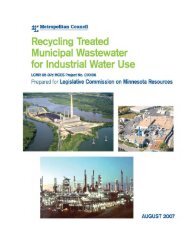Consultant's Report - Minnesota State Legislature
Consultant's Report - Minnesota State Legislature
Consultant's Report - Minnesota State Legislature
You also want an ePaper? Increase the reach of your titles
YUMPU automatically turns print PDFs into web optimized ePapers that Google loves.
MINNESOTA DEPARTMENT OF NATURAL RESOURCES<br />
Feasibility Study to Limit the Spread ofZebra Mussels from Ossawinnamakee Lake<br />
mg/l Ca 2 +, with dense populations developing in waters with 2: 21 mg/l Ca 2 + (Mellina and<br />
Rasmussen 1994). Calcium concentrations of 15 mg/l or less were found to limit zebra mussel<br />
development (Mellina and Rasmussen 1994). Negative zebra mussel shell growth was reported<br />
at levels less than 8.5 mg/l by (Hincks and Mackie 1997). Ca 2 + at :s 12 mg/liter is required for<br />
successful zebra mussel veligers rearing (Sprung 1987). Generally, zebra mussel populations are<br />
positively correlated with Ca 2 + concentrations and negatively correlated with P04-3 and NO- 3<br />
concentrations (Ramcharan et al. 1992).<br />
The amount of hydrogen ions in the water, i.e., pH, impacts the ability of zebra mussels to<br />
survive and reproduce in a water body. Claudi and Mackie (1993) found that minimum pH<br />
limits are 6.5 for adult zebra mussels, 7.4 for veligers, and> 8.0 for moderate to maximal adult<br />
growth. Sprung (1987) found that a pH of 7.4 - 9.4 is required for successful veliger<br />
development.<br />
Reponses to Starvation<br />
Zebra mussels feed primarily on planktonic algae and zooplankton, with bacteria, detritus, and<br />
organic matter being alternate food sources. The availability of food sources has been shown to<br />
control zebra mussel populations (Sprung and Rose 1988). In high-density populations, adult<br />
zebra mussels have been known to compete with plankton algae for limited food resources, thus<br />
reducing the survival of the planktonic veligers (Strayer et al. 1996). Under laboratory<br />
conditions, Schneider et al. (1998) suggested that food quality may be a better indicator of<br />
environmental conditions suitable for zebra mussel growth than food quantity. These results<br />
suggest that zebra mussels do not thrive in an abundant suspended inorganic sediment<br />
environment, which is indicative oflarge, turbid rivers (McMahon 1996).<br />
Generally, zebra mussels have a high starvation tolerance. For adult zebra mussels, Chase and<br />
McMahon (1994) reported 50 percent mortality (LTso) occurred after 118 days at 25°C and after<br />
352 days at 15°C with no source offood. One hundred percent mortality (SMlOO) occurred at 143<br />
and 545 days at 25°C and 15°C, respectively. In laboratory experiments, Sprung (1989) reported<br />
that zebra mussel veligers experjenced 100 percent mortality within 11-15 days- at 12-24°C when<br />
there was no food available.<br />
Effect of Water Velocity on Settlement, Attachment, and Feeding<br />
The speed ofwater movement, or velocity, impacts the settlement, attachment and feeding habits<br />
in zebra mussels. Juveniles will settle in internal piping and along any submerged area with a<br />
flow rate of less than 1.5 meters per second (4.92 feet per second) (Claudi and Mackie 1994).<br />
Adult zebra mussels have also been known to avoid high-velocity flow locations and typically<br />
detach from such a poor settlement location and move (e.g., crawl via the foot or float by<br />
detaching the byssal threads) to a more suitable site (Claudi and Mackie 1994).<br />
Ackerman (1999) has shown in laboratory studies that the ability of zebra mussels to clear<br />
plankton can be impacted by water velocity. Increasing ambient velocity up to approximately 10<br />
cm per second led to increased clearance rates, whereas high velocity rates of 20 cm per second<br />
resulted in reduced clearance rates.<br />
IV-11 Review ofZebra Mussel (Dreissel/u po[ymorphu) Species
















